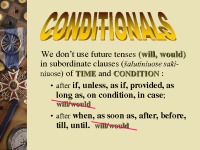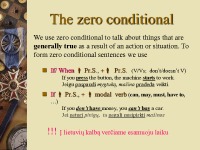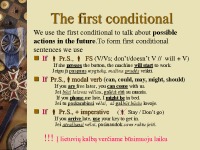Conditionals Slides



Conditionals. We don’t use future. The zero conditional. If/ When Pr. S. , + Pr. S. (V/Vs don’t/doesn’t V) If you press the button. We use the first conditional to talk about possible actions in the future. The first conditional. We use unless. We use provided/providing. We usually form second conditional sentences with If P. The second conditional. We use the. We usually form third conditional sentences with If P. The third conditional. In formal English. Mixed conditionals. The most common. The conditionals. IF-clauses (condition). Type 0 If/ When Pr. S , Pr. S (V/VS don’t/doesn’t + V). Other ways to express hypothetical (spėjamą) meaning. We use it’s. About other people. Would rather. Ass if/ as though. We use as.
We don’t use future tenses (will, would) in subordinate clauses (šalutiniuose saki-niuose) of TIME and CONDITION : after if, unless, as if, provided, as long as, on condition, in case; will/would after when, as soon as, after, before, till, until. will/would.
If/ When Pr.S., + Pr.S. (V/Vs; don’t/doesn’t V) If you press the button, the machine starts to work. Jeigu paspaudi mygtuką, mašina pradeda veikti. If Pr.S., + modal verb (can, may, must, have to, ...) If you don’t have money, you can’t buy a car. Jei neturi pinigų, tu negali nusipirkti mašinos.
We use zero conditional to talk about things that are generally true as a result of an action or situation. To form zero conditional sentences we use.
We use the first conditional to talk about possible actions in the future.To form first conditional sentences we use.
If Pr.S., FS (V/Vs; don’t/doesn’t V // will + V) If she presses the button, the machine will start to work. Jeigu ji paspaus mygtuką, mašina pradės veikti. If Pr.S.,modal verb (can, could, may, might, should) If you are free later, you can come with us.
- Languages Presentations
- MS PowerPoint 270 KB
- 2020 m.
- English
- 14 pages (1159 words)
- Gymnasium
- Rita

















